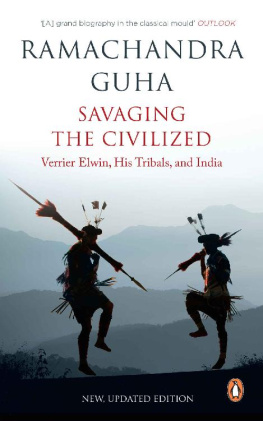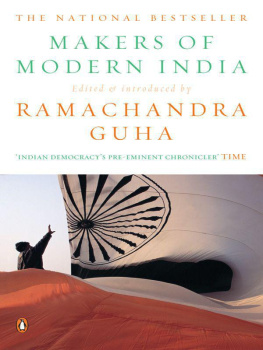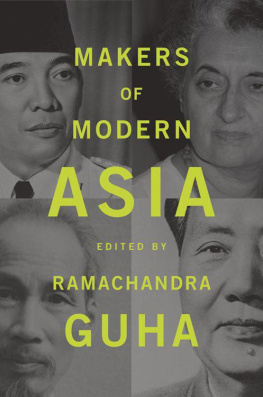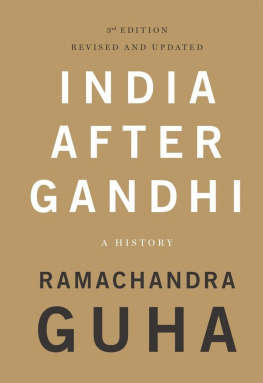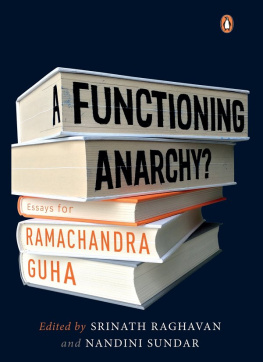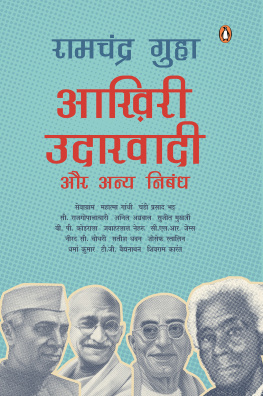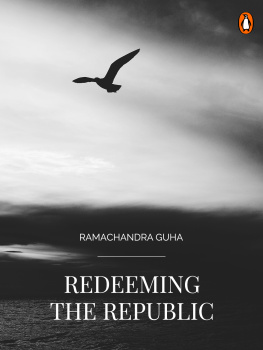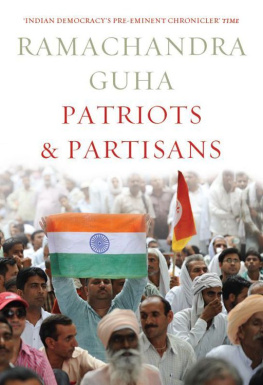Ramachandra Guha - Savaging the Civilized
Here you can read online Ramachandra Guha - Savaging the Civilized full text of the book (entire story) in english for free. Download pdf and epub, get meaning, cover and reviews about this ebook. year: 2016, publisher: Random House Publishers India Pvt. Ltd., genre: Detective and thriller. Description of the work, (preface) as well as reviews are available. Best literature library LitArk.com created for fans of good reading and offers a wide selection of genres:
Romance novel
Science fiction
Adventure
Detective
Science
History
Home and family
Prose
Art
Politics
Computer
Non-fiction
Religion
Business
Children
Humor
Choose a favorite category and find really read worthwhile books. Enjoy immersion in the world of imagination, feel the emotions of the characters or learn something new for yourself, make an fascinating discovery.
- Book:Savaging the Civilized
- Author:
- Publisher:Random House Publishers India Pvt. Ltd.
- Genre:
- Year:2016
- Rating:5 / 5
- Favourites:Add to favourites
- Your mark:
- 100
- 1
- 2
- 3
- 4
- 5
Savaging the Civilized: summary, description and annotation
We offer to read an annotation, description, summary or preface (depends on what the author of the book "Savaging the Civilized" wrote himself). If you haven't found the necessary information about the book — write in the comments, we will try to find it.
Savaging the Civilized — read online for free the complete book (whole text) full work
Below is the text of the book, divided by pages. System saving the place of the last page read, allows you to conveniently read the book "Savaging the Civilized" online for free, without having to search again every time where you left off. Put a bookmark, and you can go to the page where you finished reading at any time.
Font size:
Interval:
Bookmark:

SAVAGING THE CIVILIZED
Ramachandra Guhas many books include a pioneering work of environmental history (The Unquiet Woods, 1989), an award-winning social history of sport (A Corner of a Foreign Field, 2002), and a widely acclaimed and bestselling work of contemporary history (India after Gandhi, 2007). The first volume of his landmark biography of Gandhi, Gandhi before India, was published in 2013; the second and concluding volume will be published in early 2018.
Guhas awards include the R.K. Narayan Prize, the Sahitya Akademi Award, the Ramnath Goenka Award and the Padma Bhushan. In 2014, he was awarded an honorary doctorate in the humanities by Yale University, and in 2015, he won the Fukuoka Prize for contributions to Asian culture and scholarship.
The Unquiet Woods:
Ecological Change and Peasant Resistance in the Himalaya
Environmentalism: A Global History
The Use and Abuse of Nature (with Madhav Gadgil)
An Anthropologist among the Marxists and Other Essays
A Corner of a Foreign Field:
The Indian History of a British Sport
The Last Liberal and Other Essays
How Much Should a Person Consume?
Thinking Through the Environment
India after Gandhi:
The History of the Worlds Largest Democracy
Patriots and Partisans
Gandhi before India
Democrats and Dissenters
EDITED WORKS
Social Ecology
The Picador Book of Cricket
Natures Spokesman: M. Krishnan and Indian Wildlife
Makers of Modern India
GUHA
THE CIVILIZED
AND INDIA

PENGUIN BOOKS
for Sujata
We tend to think of an Age in terms of the man we take as representative of it, and forget that equally a part of the mans significance may be his battle with his Age.
T. S. Eliot
What makes a man change his nationality, abjure civilization and, in the upshot, become a blend of Schweitzer in Africa and Gauguin in Tahiti?
W. G. Archer on Verrier Elwin


Copyright owners have been credited below within brackets.
(between )
- Baby Verrier with Bishop and Mrs Elwin (OUP)
- Verrier, aged five (British Library)
- Dean Closes prize student, 1919 (OUP)
- A gent with a dog collarthe Vice Principle of Wycliffe Hall Seminary, Oxford, 1926 (Wycliffe Hall)
- Elwin with Gandhi, Sabarmati Ashram, 1931, the dutiful Mirabehn following (OUP)
- Elwin with his fellow followers Jamnalal Bajaj and Pyarelal (in spectacles), Dhulia Jail, 1932 (OUP)
- Mary Gillet, in the courtyard of the Ashram of St Francis, Tikeri Tola, 1933 (Verrier Elwin/British Library)
- Shamrao Hivale, sometime in the mid nineteen thirties (Verrier Elwin/British Library)
- Kosi Elwin, c. 1940 (Verrier Elwin/OUP)
- A Baiga veteran (Verrier Elwin/OUP)
- Muria chelik and motiari outside the ghotul (Sunil Janah/OUP)
(between )
- The Deputy Director of the Anthropological Survey of India, on the balcony of his Calcutta home, 1949 (Sunil Janah)
- Lila Elwin, c. 1963 (Sunil Janah/OUP)
- Kumar Elwin, somewhere on the Frontier, c. 1960 (OUP)
- The sahib and the scholarElwin with Professor C. von Frer-Haimendorf, Shillong, 1954 (OUP)
- A Konyak Naga girl (Verrier Elwin/OUP)
- Jawaharlal Nehru visiting Elwins house and museum, Shillong, 1955, with Jairamdas Daulatram in the background (OUP)
- Cover portrait of the Indian edition of The Tribal World of Verrier Elwin (OUP)
- Elwin receiving the Padma Bhushan from the President of India, New Delhi, 1961 (Nehru Memorial and Museum Library)

A writer is not supposed to discriminate between his books, just as a parent is not supposed to favour one child over another. As a father of two I hope I have been moderately impartial. On the other hand as an author I am less than even-handed. Savaging the Civilized is, and shall always remain, the favourite among my books. For one thing, reading Verrier Elwin changed my life. For another, researching about him took me to parts of India (and England) I might otherwise never have visited. For a third, writing about Elwin meant engaging with that most challenging of literary forms, the biography.
As I relate in the Acknowledgements, I first heard of Verrier Elwin from an Oriya veterinarian in the summer of 1978. I was then doing an M. A. at the Delhi School of Economics. I was, in academic terms, somewhere near the middle of the class, but still hoped to make a career in research. When I returned to Delhi from Orissa, I found two of Elwins books in the college libraryhis Wodehousian diary Leaves from the Jungle, and his evocative autobiography, The Tribal World of Verrier Elwin. Reading them encouraged me to move to Kolkata for a Ph. D in sociology, a shift described by one of my erstwhile professors as a Pareto Optimum: good for me, and better for economics.
In Kolkata, I wrote my doctoral dissertation on the social history of forests, in the course of which I encountered Elwin again. In his ethnographies he had written with feeling about the destructive impact that colonial forest laws had on tribal livelihoods. Reading books like The Baiga and The Agaria deepened my admiration for Elwin, and my interest in his career. I was attracted by the fact that he was an engaged rather than detached scholar, and that he wrote so uncommonly well.
Through the 1980s I worked on environmental themes. I had published two books and a dozen research papers before I decided to write a book on Elwin himself. Even so, I began gingerly. The discipline of sociology is antithetical to the biographical method, since it privileges the individual above society. So I framed my project as being about larger issues, giving it the rather grand title The Tribal Question in Modern India. The more I read, however, the more I understood how central Verrier Elwin was to debates about tribal policy before and after Independence. Within a year of my beginning focused research on the subject, the project title had been changed to Verrier Elwin and the Tribal Question in Modern India.
My academic training had oriented me towards thinking of castes and classes rather than character and beliefs. Then again, I was raised a Hindu, and Hinduism does not privilege the singular individual with a finite span on earth (why memorialize a life when the fellow has already been reborn?). Finally, at the time I was deeply influenced by Marxism, which likewise disparages the role of the individual in the making (and unmaking) of history.
Font size:
Interval:
Bookmark:
Similar books «Savaging the Civilized»
Look at similar books to Savaging the Civilized. We have selected literature similar in name and meaning in the hope of providing readers with more options to find new, interesting, not yet read works.
Discussion, reviews of the book Savaging the Civilized and just readers' own opinions. Leave your comments, write what you think about the work, its meaning or the main characters. Specify what exactly you liked and what you didn't like, and why you think so.

